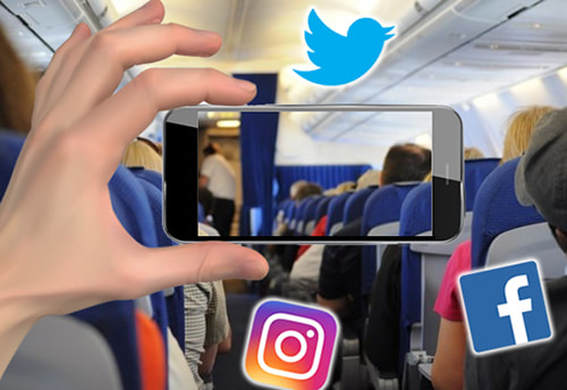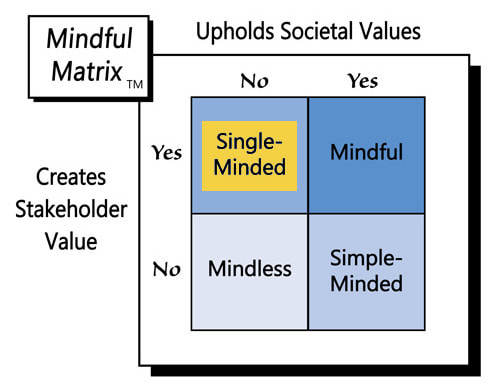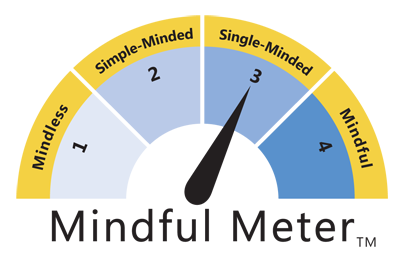A few weeks ago, Helen (last name unknown) was settling into an Alaskan Airlines flight from New York to Dallas when another passenger, Rosey Blair, asked if she’d switch seats. Blair wanted to sit next to her boyfriend, Houston Hardaway, who was in the row behind her. Helen obliged, which put her in front of Blair and Hardaway, and next to an attractive stranger, who later identified himself as Euan Holden, a former professional soccer player.
As the plane took off, so did an apparent romance between Helen and Holden. The unexpected seatmates’ casual conversation turned flirtatious and eventually the two were touching elbows on that ambiguous middle armrest. When the flight landed and passengers deplaned, the two could be seen strolling through the terminal together.
Given 40,000+ flights in the United States each day, how do we know so much about the interaction between two ordinary air travelers? We’re privy because Blair chronicled everything about the blossoming relationship from the row behind them.
Around 15 times, Blair tweeted about things she saw and overheard such as the couple discovering that they were both personal trainers and vegetarians. Pictures and videos accompanied some of the tweets, as well as the hashtags #PrettyPlaneGirl and #PlaneBae. In very little time, Blair’s tweets amassed 630,000 likes and 250,000 retweets, then mainstream news media began to share the touching tale.
Sounds like a relationship and social media success story, right? Not quite. Helen was unaware of Blair’s inflight antics and was very unhappy to be flung into the national media spotlight, especially after the attention led to online harassment and the need to delete her social media accounts. Helen issued a statement through an attorney that included: “I did not ask for and do not seek attention. #PlaneBae is not a romance - it is a digital-age cautionary tale about privacy, identity, ethics and consent.”
Wow. That’s a strong reaction, but did Blair do anything wrong? After all, it’s legal to photograph people in public places where there is no “reasonable expectation of privacy.” The incident occurred on a commercial airliner, apparently in coach, where hundreds of people are packed like sardines. It’s hard to get much less private.
“Reasonable expectation of privacy,” however, is subject to interpretation. Yes, a commercial airliner is a rather pubic place, but most passengers wouldn’t expect the people behind them to be eavesdropping on them throughout an entire flight or photographing them from above and between the seats.
An even bigger issue involves Blair’s occupation. According to her Twitter page, she a plus-size fashion, lifestyle, and travel blogger, which means her livelihood depends on sharing content on social media. Gaining likes, shares, and followers is key to her success, and to have a post go viral is golden.
Blair’s profession matters because it reframes her motives and recontexualizes her actions. She’s no longer just a person sharing with friends a few photos she took of strangers. She’s an entrepreneur employing visual and verbal accounts of others to advance her business interests. She’s a marketer using Helen and Holden, without recompense, to build her brand. Jayson DeMers describes such situations in a 2014 Forbes article:
“The danger in using photos of individuals for your online marketing purposes is that your efforts could be seen as commercial. The rules when it comes to using photos for commercial purposes differ from when you’re merely sharing vacation photos with your buddies. Even if you aren’t directly making money off of the usage, a photo in a social media campaign can easily be seen as similar to using a photo in a print brochure or billboard ad.”
What Blair did was not clearly illegal, but her actions could easily land her on the losing end of a lawsuit, as DeMers continues to explain: “If your subject believes his likeness was used to sell a product without his permission, you may find yourself on the losing side of an argument in front of a judge.”
Ethics, however, is not simply a matter of ‘legal’ or ‘illegal.’ It’s about doing the right thing no matter what the law says. In that light, a good question for Blair or anyone in a similar situation to ask is “Would I want someone else to eavesdrop on my conversation, take pictures of me without my knowledge or permission, and share those things on social media?”
Most of us would say, “Of course not.” So, if that’s the kind of consideration we’d like for our own privacy, we should obey the Golden Rule and show the same respect to others.
Everyone makes mistakes, and Blair seems to recognize that her social media sharing of two strangers’ personal interactions was wrong. She has offered an apology; although, she failed to delete most of her tweets about the incident. For this reason and all of the above, Blair’s creation and promotion of “Plane bae” should be considered “Single-Minded Marketing.”
Learn more about the Mindful Matrix and Mindful Meter.
Check out Mindful Marketing Ads and Vote your Mind!




 RSS Feed
RSS Feed